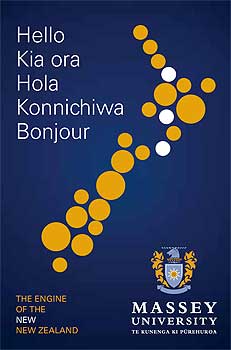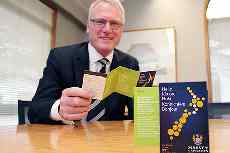Massey challenges Kiwis to use their language skills

Download a PDF of one of our
language cards here.
Request a copy or copies of our
language cards here. (Please
include full address details).
Listen to audio clips of the phrases
Massey University has identified a practical response to calls for New Zealanders to be more welcoming of Rugby World Cup visitors.
It involves a wallet-sized card with greetings and phrases in five of the languages spoken by the competing teams – French, Spanish, Japanese, Māori and English.
Massey Vice-Chancellor Steve Maharey says 70,000 cards – devised and translated by staff of the School of Linguistics and International Languages and the School of Mäori Studies – are being distributed nationwide.
“Rugby World Cup is the perfect opportunity for New Zealanders to try something new, or for others with language skills learnt at school, while abroad or at University to use them.”
Mr Maharey says welcoming visitors by saying hello in their own language is an important part of showing manaakitanga. "Multilingualism is the norm for many supporters and players coming from other parts of the world,” he says. "The challenge for us to give other languages a go to help our guests feel at home."
He says he has been practising the phrases using the sound files on the University’s website to help with pronunciation.
In addition to basic greetings and practical questions a visitor might ask ("Where is a money machine", "Two beers please"), there are also a couple with a sense of humour or rugby vernacular ("Put your glasses on, ref!").
Another useful aspect of the cards, for spectators watching the All Blacks play, is the inclusion of the words of the haka, Ka mate, and the national anthem, God Defend New Zealand, in Mäori and English.
